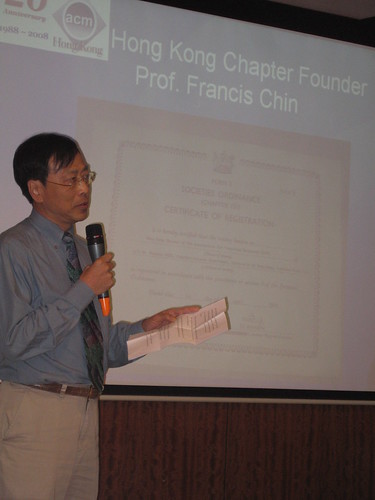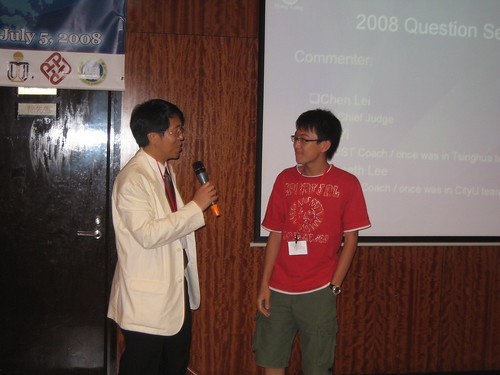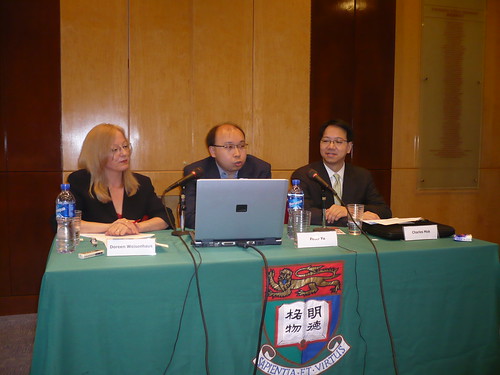Charles Mok 可圈可點
Wednesday, July 16, 2008
Monday, July 14, 2008
IT業界十年人事幾番新
今年度立法會會期快將結束,代表資訊科技界的單仲偕將於今屆卸任,轉眼之間,單仲偕已經擔任這個位置十年之久。從1998年至2008年,資訊科技界的確已有不少轉變。十年前互聯網熱潮正在興起,至2000年網股爆破,再步入2003年沙士之後的經濟低潮,到這兩年的反彈,繼而前瞻未來數年可能受到全球經濟不景的拖累,香港的資訊及通訊科技界難免受到大環境影響,有時甚至大起大落。
但 無可否認的是十年前後香港的社會與經濟,甚至政府的政策,對資訊及通訊科技比前是更重視了,這是不爭的事實,當然,這很大程度是因為互聯網應用在香港的普 及發展,這是功不可沒的。香港的電訊開放政策帶動互聯網和流動通訊基建及服務的發展,令香港在這方面完全不比任何地方遜色,另外,在改善和便利市民生活的 應用技術,如八達通、智能身份證等,乃至以資訊及通訊科技為支柱行業,如金融、物流、醫療等提供的支援能力,都保持或提升至更高的世界水平。
香港IT向好發展
明 顯地資訊及通訊科技和這個界別;甚至互聯網和其應用已經被香港社會、市民生活、政府及商業運作接受為重要和不可缺少的部分,而展望未來,香港的資訊及通訊 科技產業仍然有很多大型發展機會,尤其「無線城市」和「無間資訊社會」,後者正是單仲偕在2004年經已提出的政策建議,至今已見勢頭開始形成。單仲偕 「在公共和社會服務方面表現卓越,尤其在促進本港資訊科技業發展及推動社會各界更廣泛應用資訊科技方面的貢獻」,無論如何,這始終是他於2007年獲頒授 銀紫荊星章時政府的嘉許。
但產業依然面對很多難題,包括人才不足或斷層、人員待遇或專業地位未如理想、中小型資訊及通訊科技企業經營及市場 上面對的困難,這些都關係到產業結構未能帶動業界均衡發展,也是資訊及通訊科技界別的整體任務。例如,資訊及通訊科技專業地位認證這問題,即使當議員的早 就開展了界內諮詢,但若部分界內團體未能達到共識,展拖字訣不到談判桌,誰可強行「立法」?
不可忘記的,作為一位立法會議員,無論是直選抑 或功能界別選出,都要向全香港市民負責,最重要的工作首要依然是立法,故此,議論政策和審議法例的能力與質素,始終是最重要的,不能只顧以空話要求別人重 視自己界別。很多功能界別議員在立法、議政能力顯然不足,界別內外議題立場模糊,這是不可接受的。
功能議員任重道遠
在 這十年,與資訊及通訊科技相關的法例修訂或立法,由電子交易法例至非應邀電子訊息法例這些直接關乎科技的,以至在電訊、版權等法例的修改,甚至其他法例對 資訊及通訊科技界的影響,例如二十三條立法,單仲偕在法案工作上的成績是得到議會內外肯定的,達到中立、不偏不倚,能明白和平衡界別內外不同的訴求和需 要。
代表界別的議員的形象和行為,直接影響到公眾對整個界別的印象。當前業內很多人士,尤其新入行的年輕人,正埋怨IT人得不到社會重視, 所以代表界別的人必須要有知識、有能力、有遠見,言行必須要專業、獨立,百分百有誠信,不作令自己和界別蒙羞的事。單仲偕常對人勉勵說,必定要「白過白 紙」,看現在他要離開立法會時市民和輿論之依依不捨,他應該已經成功了。
刊載於《信報財經新聞》2008年7月14日
Saturday, July 12, 2008
單仲偕的十年
本星期我在香港電台第二台的《e個世界》(逢星期六下午六至八時)節目中,讀出以下錄音環節,題目是「單仲偕的十年」,請收聽 :Free Culture in Hong Kong
More than two years ago, I joined the first Chinese Wikimedia Conference held in Hong Kong.One year ago, I joined these young Wikimedians in Hong Kong at the inauguration ceremony of Wikimedia Hong Kong (WMHK).
Today, I am so glad that ISOC HK is co-organizing this Wikimedia Hong Kong 1st Anniversary conference with WMHK!

Wednesday, July 09, 2008
Transformation of ICT Industry in Hong Kong
I made this presentation for Juniper Network's Solution Day 2008 in Hong Kong today.Tuesday, July 08, 2008
The ".hk" dodgy domain scandal
The ".hk" dodgy domain scandalComputerworld Hong Kong
On June 4, network security firm McAfee released a report claiming that Hong Kong's country-code top-level domain (ccTLD) ".hk" is the "riskiest" in the world. Out of all of these domains, 19.15% may cause harm to users. ".hk" was closely followed by China's ".cn": 11.76% of Chinese sites were found problematic.
[click to read entire article]
Monday, July 07, 2008
評論香港數碼版權初議
上周筆者參與了在香港大學舉辦的研討會,主題是「香港未來的數碼版權保障」,談論的是商務及經濟發展局在今年4月公布的「在數碼環境中加強保護版權的初步建議」諮詢文件。在 這個議題上,我的立場是法律必須足夠保障版權擁有者的投資、研究、開發和製作的成果,而保障過程的成本應是公道、合理,對消費公眾是便利和可以負擔的。知 識產權與實物的產權是不同的,在概念上與法律下亦然,知識產權法律不單要保障產權擁有者和原創者,也要包容用戶的權益,包括「後來競爭者」。政府與立法者 也不應利用版權法律加入其他方面的限制,例如公平使用、言論自由、私隱及其他公眾利益。
知識產權在美國憲法是得到明文保護的,但當中說的是:「為推進科學和有用的藝術發展,在有限時期內,保障作者或發明者的寫作和發現的專有權利」,很重要的兩個概念是進步發展和時間限期。但這兩個原則往往並未在現代版權法律諮詢中得到重視。
政 府在這階段的諮詢中,的確有採納用戶和公眾的意見。互聯網用戶的回應聲音比以前都要強大,作用也發揮了出來,政府在這初步建議希望找到平衡,但我們要小心 注意平衡有否令任何一方得到了一些,卻失去了更多不能彌補的東西,若有這種平衡就不妙了。當然,用戶利益要保障,但版權侵犯行為的確猖獗,產權擁有者希望 加強保障是可以理解的,而我們在爭取用戶權益中,肯定並非為了保護這些不當、違法的行為。
串流定義欠清晰
政 府的初步建議中,首先提出「為版權作品引入一項涵蓋所有電子傳送模式的傳播權利,並訂定違反這項權利的刑責」,雖然指出若「把所有未獲授權的傳播作為一律 列為刑事罪行,可能會令刑責範圍過廣,造成不利的深遠影響」,所以只「建議針對在指明情況下未獲授權而主動向公眾傳播作品的作為增訂刑責」,而這兩項指明 情況包括「為業務目的或在業務過程中傳播作品(業務是指牟利的經營,而其中包括向公眾提供未獲授權傳播版權作品的服務)」和「並非為業務目的或在業務過程 中把版權作品以『串流』的模式傳播至接收者,而傳播達到足以損害版權擁有人的權利的程度」。
但為什麼要針對串流?文件沒有清楚定義何謂串 流,學術、業界也從未能把這技術清楚劃出界線,若是這樣立法,一方面有違「技術中立」,二則針對範圍不明,三也不會追得上技術進步,這樣是非常危險,而且 文件完全沒有說明這建議是為了針對那些串流活動,是文件資料提供不足之處。要針對YouTube這類上載分享或中國內地較流行的點對點串流,是兩碼子的 事,但侵權上載YouTube應能以現行法例處理,而點對點串流在港並不流行,那立法目的和需要在哪裏?政府必須澄清。原本政府說要避免「令刑責範圍過 廣」,但其有關串流建議正有此效。
另外,政府在上一階段諮詢中提出法定損害賠償,但回應多數反對,而且政府「並未察覺在香港有其他關於侵權 訴訟的法定損害賠償例子」,若然引入法定損害賠償,會對其他民事法律程序造成深遠影響。為了「平衡」,諮詢文件建議「在法例訂明其他因素,以協助法庭考慮 可判給的額外損害賠償,代替就侵犯版權的訴訟引入法定損害賠償」,這些因素包括「被告人在作出侵權行為後的作為,例如企圖隱瞞或掩飾侵權活動,或採取其他 損害版權擁有人權利的行動」,「在網上盜版個案中,侵權複製品透過數碼傳送可能達到的廣泛流傳程度」和「阻嚇類似侵犯版權行為的需要」,但恐怕這些因素仍 然不清楚、不客觀,而阻嚇因素更可能引致對個別被告不公平地受針對。
媒體轉換生枝節
最 後,政府初步建議中提出了媒體轉換這「新課題」,是原諮詢文件沒有提及的,算是從善如流,值得一讚。近年在英國、紐西蘭、澳洲等地,已開始就媒體或格式轉 換成為豁免版權限制的例外,作出諮詢、審議或立法程序,讓擁有正版音樂聲音紀錄及其他某幾類版權材料的消費者, 可以在某些指定情況下把內容有限數量複製, 供自己使用。不過,政府建議的新的例外情況,不容許用戶規避「科技措施」,即版權擁有人若在其電影、音樂光碟中加入數碼版權管理(DRM)技術,媒體轉換 立刻明存實亡,這是不可接受的。在上階段諮詢中強烈提出這議題的包括香港互聯網協會,要求的是「公平使用」原則,納入版權法律觀念,現在「得到」的只是很 有限的媒體轉換,前後是兩回事。
香港未來的數碼版權法律,決定我們的數碼社會發展未來。研討會中的學者意見指香港現在的數碼版權法律觀念仍 落後海外,類似歐美十多年前立法的規管方向,人家現在已發現到問題,香港不宜抄襲落後的數碼版權概念,應以更包容公眾利益的方向,修訂出進步前瞻並有利香 港未來數碼社會和經濟發展的法律。
刊載於《信報財經新聞》2008年7月7日
Saturday, July 05, 2008
ACM Programming Contest 2008
Tonight I was a guest at the ACM Programming Contest (Hong Kong) 2008 held at the City University of Hong Kong. This year also marked the 20th anniversary of ACM Hong Kong Chapter, ad Prof Francis Chin (below) of the University of Hong Kong gave an insightful speech about the changes seen in the last twenty years in computer science, and looking forward to the next decades.
I took a look at the questions that the students teams had to tackle in the time of an afternoon. Well, I was not sure if I could do what they have accomplished twenty years ago myself, and I am certainly not trying to sound humble!

[Prof Ngo Chong-Wah and one of the students]
銀行遺失客戶通話錄音帶
本星期我在香港電台第二台的《e個世界》(逢星期六下午六至八時)節目中,讀出以下錄音環節,題目是「銀行遺失客戶通話錄音帶」,請收聽 :Thursday, July 03, 2008
Privacy and Security Principles for Health Information Technology
It has come to our attention that recently the Center for Democracy and Technology (CDT) has released in June a briefing on public health policy issues affecting civil liberties online. This issue has become a hot button in the U.S. because of the strong push for the adoption of IT in healthcare there. But this is of course timely for us in Hong Kong too, in the aftermath of the leakage of personal data in our hospitals. (Indeed, tonight it was reported that HSBC has once again "lost" a tape containing 25,000 customer call conversations that include personal data.)This afternoon, I also attended a briefing by Cisco with its public sector executives from the U.K. and New Zealand sharing with us their experience with privacy protection in public bodies in their countries. We are reminded that the incidents we face in Hong Kong are not unique or exceptional. We also have to be careful about striking a balance between more openness (which is a global trend in government and demanded by citizens in most developed countries) and becoming more guarded and closed because of concerns about privacy.
Working with the Hospital Authority Task Force on Patient Data Security and Privacy, we are working hard to finalize our final report – to analyze the lessons learned in the previous incidents and the recommend further improvements in structure, processes and the training and communications with people. The Privacy Commissioner's Office will also likely release its report soon on the incidents after it has conducted its “data inspection.” While the PCO report will look more specifically into the existing situation and making its comments and suggestion, the Task Force's report hopefully would be more forward looking.
References:
Privacy and Security Principles for Health Information Technology
Wednesday, July 02, 2008
Shaping Hong Kong's Digital Future
This evening Prof Peter Yu – leading academic expert on intellectual property laws from Drake University – and I spoke at the University of Hong Kong to discuss “the future of digital copyright protection in Hong Kong.” Peter put it very well when he said that Hong Kong's future as a digital hub is at stake, and this is in the end what this round of the digital copyright review is all about.
My basic principles on digital copyright can be summarized as follows. The law should protect the rights of the copyright owners so that they can enjoy the fruits of their investment, research and development, but at a price that is fair and affordable by the consumer public, in a manner that is reasonable and convenient. Copyright is not the same as property right, and the copyright laws should protect both the rights owners and the users, including follow-on innovators. Finally the government and lawmakers should not, or allow others to, “sneak in” extra regulations that are intended for limiting “other things” and thereby undermining fair use (which must be protected in the first place), freedom of speech, privacy or other important matters of public interest, or interests of the public.
The U.S. Constitution Article I, Section 8 on copyright made the concept quite clear: “To promote the progress of science and useful arts, by securing for limited times to authors and inventors the exclusive right for their respective writings and discoveries.” Progress oriented. Limited time.
Looking back at the current Government proposal on digital copyright amendments, the Administration can be commanded for having listened to the views of the user public, and of course, in the consultation that ended in early 2007, the users had spoken in a much bigger number than before. Obviously the Government is trying to strike a balance between what the rights owners want, and what the users want. But, Peter made a great point when he spoke: what the user gains, are there other irreparable losses? If so, that is not a desirable scenario, and that may hardly be the kind of balance we want to strike.
Then of course, I have to say that I have empathy for the losses suffered by the rights owners. It is understandable that they would do all that they can to protect their rights and “properties.” And there are certainly many users out there that are abusing copyrighted works through piracy, who can hardly be called “follow-on innovators” by any stretch of imagination. These are definitely law breakers and they are not the ones we are trying to protect for these abusive acts they engage in.
In the Government proposal, there is a proposal to introduce “a right of communication covering all modes of electronic transmission for copyright works, with related criminal sanctions against the breach of this right.” It believes “a blanket criminalization of all unauthorized communication might cast the net too wide and entail far-reaching unwanted implications,” so criminal sanctions are proposed against acts of “making or initiating unauthorized communication to the public” in two “defined circumstances,” first, where “communication is made for the purpose or in the course of business,” or second, “where, other than for the course of business, communication is made by 'streaming' the copyright work to the recipients and the communication is made to such an extent as to affect prejudicially the copyright owners.”
But why single out streaming? How would streaming be defined in an ever-evolving technological world? In principle, I am against any legislation that is not technology neutral, unless “proven absolutely necessary and having no alternatives.” The law must be clear also against what type of streaming activities it is trying to curb. For example, P2P streaming services are not popular in Hong Kong, unlike the case in China. The YouTube type of streaming is popular, just like most other parts of the world, but technically the user who uploaded the file to a platform like YouTube is clear uploading, and that act should already be liable under existing law.
The Administration stated that it would like to ensure “that the criminal net would not be cast too wide as to create uncertainty or affect normal sharing of ideas/information through electronic means.” But the singling out of steaming for criminal liability has apparently done what the Administration said it wanted to avoid, by casting the criminal net too wide. As streaming is a new concept just introduced in this phase of the consultation, the Government should not rush itself into legislation.
Another matter in the consultation was the role and obligations of online service providers (OSPs). Instead of putting all the burden on the OSPs, the proposal is to “facilitate the drawing up of a voluntary code of practice for OSPs in combating Internet infringements,” the compliance with which will constitute the OSPs' due diligence in dealing with these infringing activities by the court. A tripartite forum with representatives from OSPs, copyright owners and users will be set up to explore the merits of different systems to deal with takedown procedures and other related operational details. This is in principle welcomed by both OSPs and users.
The Administration's proposal also stated that it would continue to rely on the “Norwich Pharmacal” principles, as opposed to introducing an alternative infringer identity disclosure mechanism that is not subject to scrutiny by the court. This means the copyright owners will still have to go to the court in order to get the identities of the alleged infringing parties revealed for them to pursue civil remedies. Indeed, the Privacy Commissioner was adamant against any “quick and inexpensive” alternative mechanism purely for the benefits and convenience of the copyright owners. This is the also the proper way to go.
But while the Administration shelved the idea of introducing statutory damages for copyright infringement actions, it claims that “the process of proving the extent of actual losses” in the digital environment is difficult, and it proposes to prescribe in law “additional factors” to assist the court to determine additional damages – beyond the current practice of compensatory nature only. This is extremely worrisome as these factors – the defendant's conduct after the act of infringement, possible widespread circulation of the infringing copies via digital transmission, the need to deter similar infringements – are highly arbitrary and may cause unfairness in the singling out of some defendants or relying too much on the inadequate knowledge of the judges in court.
In the current proposal, the Government has put in a “new issue” -- media shifting. This subject was not in the consultation document, but many of the respondents including Internet Society Hong Kong demanded “fair use” to be included in the consultation. This is the good part – we seem to have got what we wanted. But on a closer look, the proposal on media shifting explicitly states that “the new exception should not confer any right to circumvent such technological measures so as to enable copyright owners to develop appropriate business model in face of the proposed new exception.”
In other words, if the copyright owners has put in any DRM (digital right management), then forget about media shifting. So this may render the whole media shifting provision meaningless and useless, as copyright owners will slap DRM on any new releases and bypass this media shifting rights conferred to users. Moreover, most of the DRM used today are not directed against copyright infringements, but used to prevent media shifting itself. So how about that? You see, we asked for fair use, we got media shifting. The user community should continue to insist to get fair use included in the law as an overriding principle, not a watered down media shifting provision with strong limitations.
Once again, this is about Hong Kong's digital future. Our Hong Kong 2.0. Please get your voices heard by the Government by sending in your comments to the current phase of consultation – the easiest way is through email to Legco secretariat at pi@legco.gov.hk and by copy to the Commerce and Economic Development Bureau at ctbeq@cedb.gov.hk .
References:
Preliminary Proposals for Strengthening Copyright Protection in the Digital Environment






